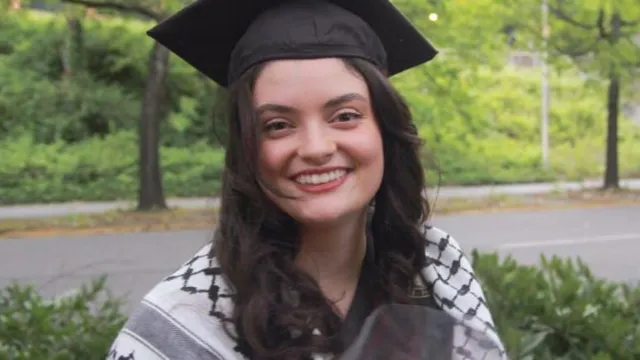The United Nations has called for a “full investigation” into the killing of a US-Turkish woman in the occupied West Bank during a protest on Friday.
Aysenur Ezgi Eygi was killed after Israeli forces opened fire.
The 26-year-old was taking part in a weekly protest against Jewish settlement expansion in the town of Beita near Nablus.
According to local media reports, Ms Eygi was shot by Israeli troops. Israel’s military said it was “looking into reports that a foreign national was killed as a result of shots fired in the area”.
An eyewitness told the BBC World Service’s Newshour programme he had heard two shots fired at the protest.
Reacting to the killing, Stéphane Dujarric, the spokesman for the UN secretary general, said: “We would want to see a full investigation of the circumstances and that people should be held accountable.”
Civilians, he added, “must be protected at all times”.
The US also called for an investigation into the incident. Sean Savett, spokesman for the White House’s National Security Council, said Washington was “deeply disturbed by the tragic death of an American citizen”.
“We have reached out to the government of Israel to ask for more information and request an investigation into the incident,” Mr Savett said.
Footage from the scene shortly after the shooting shows medics rushing Ms Eygi into an ambulance.
Jewish-Israeli activist Jonathan Pollak, who was at the protest, told BBC World Service’s Newshour programme he had seen “soldiers on the rooftop aiming”.
He said he had heard two separate shots, “with like a second or two distance between them”.
“I heard someone calling my name, saying in English, ‘Help us. We need help. We need help.” I ran towards them,” he said.
He said he had then seen Ms Eygi “lying on the ground underneath an olive tree, bleeding to death from her head”.
“I put my hand behind her back to try and stop the bleeding,” he said. “I looked up, there was a clear line of sight between the soldiers and where we were. I took her pulse, and it was very, very weak.”
He added that Friday’s demonstration had been Ms Eygi’s first time attending a protest with the International Solidarity Movement, a pro-Palestinian group.
The dual-national was rushed to a hospital in Nablus and later pronounced dead.
Dr Fouad Nafaa, head of Rafidia Hospital where Ms Eygi was admitted, confirmed that a US citizen in her mid-20s had died from a “gunshot in the head”.
US Secretary of State Antony Blinken deplored the “tragic loss”, while Turkish President Recep Tayyip Erdogan branded the Israeli action “barbaric”.
Turkey’s foreign ministry said Ms Eygi had been “killed by Israeli occupation soldiers in the city of Nablus”.
Before travelling to the Middle East, Ms Eygi had recently graduated from the University of Washington in Seattle.
The school’s president, Ana Mari Cauce, described news of her death as “awful” while adding that Ms Eygi had had a “positive influence” on other students.
Ms Eygi was born in Antalya, as reported by Turkish media.
In a statement, the Israel Defense Forces (IDF) said: “During Israeli security forces activity adjacent to the area of Beita, the forces responded with fire toward a main instigator of violent activity who hurled rocks at the forces and posed a threat to them.
“The IDF is looking into reports that a foreign national was killed as a result of shots fired in the area. The details of the incident and the circumstances in which she was hit are under review.”
In his interview with the BBC, Jonathan Pollak was asked about the IDF’s statement, where the Israeli military said security forces had responded to stone-throwing.
Mr Pollak said there had been clashes but he felt that soldiers had been “under no threat”.
There had been “no stone throwing” where she had been, he said.
Israeli forces withdrew from Jenin city and its refugee camp in the occupied West Bank on Friday, following a major nine-day operation there.
The Palestinian health ministry says at least 36 Palestinians were killed – 21 from Jenin governorate – in that time. Most of the dead have been claimed by armed groups as members, but the ministry says children are also among those killed.
In the past 50 years, Israel has built settlements in the West Bank and East Jerusalem, where more than 700,000 Jews now live.
Settlements are held to be illegal under international law – that is the position of the UN Security Council and the UK government, among others – although Israel rejects this. BBC


